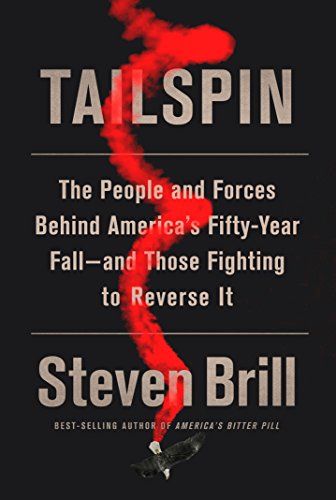Tailspin
Book Reviews
This is another in a series of book reviews of current books that are likely of interest to at least some Classmates. If you know of such a book, contact us, please. BTW, we’d love to get a review of Michael Pollan’s How To Change Your Mind, preferably from a Classmate who knew something about psychedelics at Yale in the late ’60s.
 Steve Brill was three years behind us – Class of ’72 — and he takes our generation to task for what’s happened to America over the past 50 years.
Steve Brill was three years behind us – Class of ’72 — and he takes our generation to task for what’s happened to America over the past 50 years.
He’s had an incredible career as an investigative journalist and entrepreneur … with top-level access to the legal and financial elites of this country. He knows how things really run in America, and his analysis is extremely insightful and well-documented.
The opening chapter lays out his argument that “the meritocracy” arrived at Yale and other places in the 1960s, displacing the old WASP aristocracy.
“The most talented, driven Americans chased the American dream — and won it for themselves. Then, in a way unprecedented in history, they were able to consolidate their winnings, outsmart and co-opt the government that might have reined them in, and pull up the ladder so more could not share in their success or challenge their primacy.”
Brill relates how he got a break, able to go to Deerfield on a full scholarship, leaving his humble, Jewish, public-school roots behind in Far Rockaway, Queens. He recounts a visit he got there from Inky Clark himself in the autumn of his senior year at Deerfield and what he later learned about Brewster’s and Clark’s efforts to replace the historical preferences for wealthy, privileged applicants with scrappier, meritocratic ones from all different backgrounds.
After graduating from Yale Law School in ’75, Brill worked briefly in NYC government, then founded The American Lawyer magazine … and later, CourtTV, Brill’s Content, Clear (speeding up airport security for a fee) and other ventures and books. From that vantage point, he got great insights into the public policy roots of our current political and economic mess.
I found his analysis very insightful and powerfully correct. It includes things like the weaponization of the First Amendment, the over-reliance on due process (and the attendant delays), the corrosive effects of unlimited campaign finance, the short-termism of corporate and civic leaders, the evisceration of unions and other sources of economic balance against corporate misbehavior, the radical inequality of incomes, and the erection of “moats” to protect the power and position of those who enjoy good fortune now.
If you care at all about “political economy” and want an excellent diagnosis of why we are in this mess, I strongly recommend you get this well-written, richly sourced and compelling book. Here’s a taste:
For Americans to come together now to fix their country, they will have to overcome the forces that have broken their country: a meritocracy that has become the new aristocracy; the financialization of the economy and the resulting dominance of short-termism; the hijacking of the First Amendment that allowed money to take over Washington; the marginalization of the middle class that would have to rise up and support any resurgence; the polarization, entrenched incompetence, and cronyism that have soured most outsiders on the prospect of trying to get Washington to do anything productive; the moats that the winners have built to protect their winnings; and the success of political leaders serving those at the top in splitting the middle class from the poor, even as the middle class becomes poorer.
You can also go online and read a sample chapter.

12/20/2018 – Ross Douthat makes a similar point about meritocracy in today’s New York Times: https://www.nytimes.com/2018/12/19/opinion/meritocracy-populism-political-stalemate.html